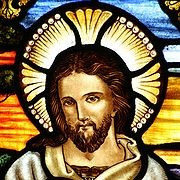- Christian corporatism
-
Christian corporatism is a societal, economic, or political application of the Christian doctrine of Paul of Tarsus in I Corinthians 12:12-31 where Paul speaks of an organic form of politics and society where all people and components are functionally united, like the human body.[1] Christian corporatism has been supported by the Roman Catholic Church, Protestants, Christian democrats, and others.[2][3] Economic application of Christian corporatism has promoted consultations between employers and workers and has sponsored Christian trade unionism.[4]
Roman Catholic
During the Middle Ages, the Roman Catholic Church sponsored the creation of various institutions including brotherhoods, monasteries, religious orders, and military associations, especially during the Crusades to sponsor connection between these groups.[5]
In 1881, Pope Leo XIII commissioned theologians and social thinkers to study corporatism and provide a definition for it. In 1884 in Freiburg, the commission declared that corporatism was a "system of social organization that has at its base the grouping of men according to the community of their natural interests and social functions, and as true and proper organs of the state they direct and coordinate labor and capital in matters of common interest."[6]
In the aftermath of the Freiburg meeting, corporatism grew in popularity and the corporatist internationale was formed in 1890 followed by the publishing of Rerum Novarum (1891) by the Roman Catholic Church that for the first time declared the Church's blessing to trade unions and called for organized labour to be recognized by politicians.[7] Many corporatist unions in Europe were backed by the Roman Catholic Church to challenge the rise of anarchist, Marxist and other radical unions, with the corporatist unions being fairly conservative in comparison to their radical rivals.[8]
On the fortieth anniversary of the publishing of Rerum Novarum, Pope Pius XI in Quadragesimo Anno (1931) advocated Christian corporatism as an alternative to capitalist individualism and socialist totalitarianism whereby people would be organized into workers' guilds or vocational groups that would cooperate under the supervision of a neutral state.[9]
Protestant
In response to the rise in popularity of Roman Catholic corporatism in the 1890s, Protestant corporatism arose, especially in the Germany, the Netherlands, and Scandinavia.[10] However, Protestant corporatism has been far less successful in being supported by governments than its Roman Catholic counterpart.[11]
References
- ^ Wiarda, Howard J. Corporatism and comparative politics. M.E. Sharpe, 1996. Pp. 28.
- ^ Michael Gehler, Wolfram Kaiser. Christian democracy in Europe since 1945. New York, USA; Oxon: Routledge, 2004. P76.
- ^ Wiarda, Howard J. Corporatism and comparative politics. M.E. Sharpe, 1996. P39.
- ^ Michael Gehler, Wolfram Kaiser. Christian democracy in Europe since 1945. New York, USA; Oxon: Routledge, 2004. P76.
- ^ Wiarda, Howard J. Corporatism and comparative politics. M.E. Sharpe, 1996. Pp. 31.
- ^ Wiarda, Howard J. Corporatism and comparative politics. M.E. Sharpe, 1996. Pp. 35.
- ^ Wiarda, Howard J. Corporatism and comparative politics. M.E. Sharpe, 1996. Pp. 37.
- ^ Wiarda, Howard J. Corporatism and comparative politics. M.E. Sharpe, 1996. Pp. 38.
- ^ Peter Travis Kroeker. Christian ethics and political economy in North America: a critical analysis. McGill-Queens University Press, 1995. P94.
- ^ Wiarda, Howard J. Corporatism and comparative politics. M.E. Sharpe, 1996. P39.
- ^ Wiarda, Howard J. Corporatism and comparative politics. M.E. Sharpe, 1996. P41.
Categories:
Wikimedia Foundation. 2010.

